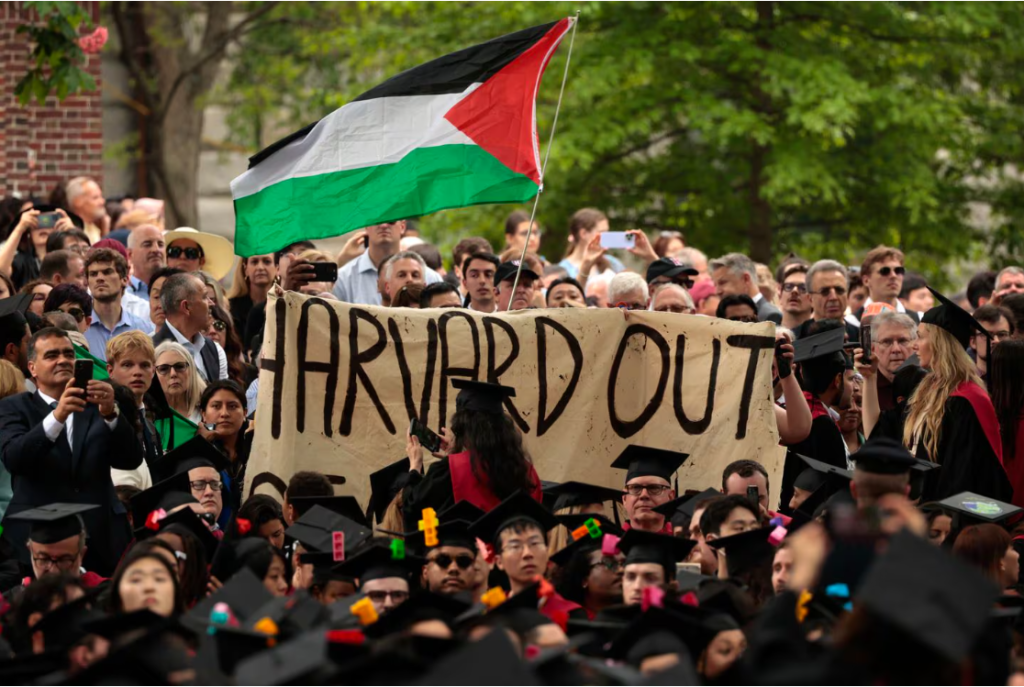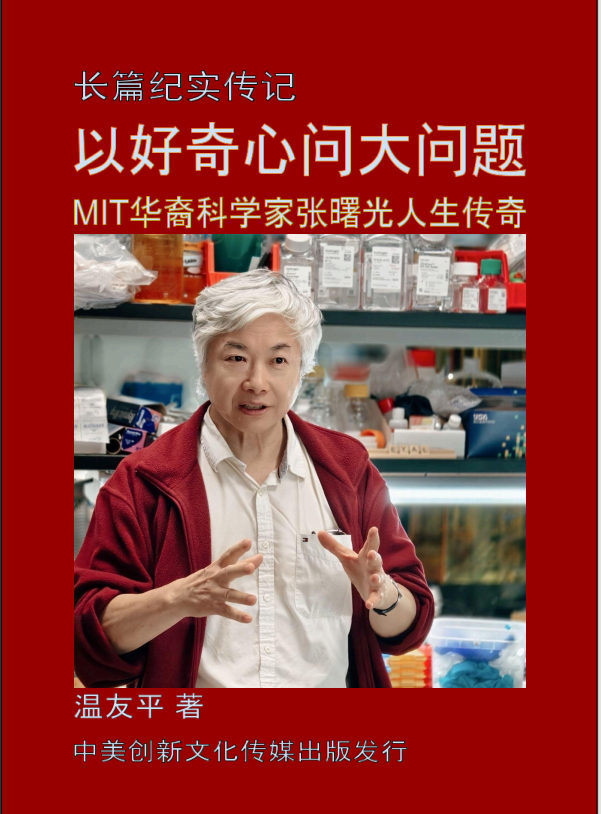【中美创新时报2024 年 5 月 29 日编译讯】(记者温友平编译)在以色列-哈马斯战争引发数月争议后,哈佛大学周二(28日)表示,其管理层将不再就公共事务发表官方声明,除非这些声明直接影响“大学的核心功能”。《波士顿环球报》记者丹尼·麦克唐纳(Danny McDonald)对此作了下述报道。
学校宣布这一消息前一个多月,学校成立了一个机构声音工作组,以考虑哈佛大学是否应该停止在重大社会和政治问题上发表立场。目前,全国各地的机构都在争论是否采取这样的政策,而在这一学年结束时,许多校园社区因战争而分裂。
该工作组在其报告中表示:“当大学就其专业领域之外的问题发表正式言论时,该机构的诚信和可信度就会受到损害。”该报告已被哈佛大学管理层接受。
“将这些原则转化为具体实践的过程当然需要时间和经验,我们期待未来的工作,”哈佛官员在致校园社区的一封信中说道。
然而,哈佛工作组指出“大学不是一个中立的机构。”
“它重视开放的探究、专业知识和不同的观点,因为这些是它追求真理的手段,”报告中写道。“只就与大学核心职能直接相关的事务发表官方言论的政策符合这些价值观。”
去年秋天,哈佛因如何评论 10 月 7 日哈马斯的袭击和以色列在加沙的致命反攻而陷入争议。时任校长克劳迪娜·盖伊因就袭击事件发表声明而受到广泛批评,许多人认为该声明为时已晚且软弱无力,尤其是与哈佛大学在其他令人痛苦的世界事件(如俄罗斯入侵乌克兰)后发表的明确声明相比。
教授和管理人员提出了一个简单的解决方案:沉默。
在此后的几个月里,哈佛大学内部和其他大学内部形成了接受某种形式的“机构中立”的势头。
机构中立并不是一个新想法。在现代学术时代,它可以追溯到 1967 年,当时芝加哥大学采取了中立政策,以避免在越南战争问题上站队。芝加哥的指导方针为“威胁大学使命及其自由探究价值观”的特殊问题以及“涉及大学所有权、资金接收、荣誉授予、其他组织成员资格”的情况提供了例外。
从那时起,其他一些学校也采取了类似的政策,而一些大学领导人即使没有将其编入学校政策,也遵守了这一原则。
然而,直到最近,这个想法还是一个在学术界内争论的相当模糊的概念。但自从 10 月 7 日让许多美国大学陷入混乱,并将其领导人卷入一场难以解决的冲突的辩论以来,从剑桥到加利福尼亚的学校都开始将机构中立视为一项官方政策。
哥伦比亚大学参议院于 2 月一致通过了机构中立。宾夕法尼亚大学和耶鲁大学的教职员工团体正在敦促其领导人也这样做。
支持者认为,采用这样的政策可以使大学更易于管理,并保护其促进开放式探究的使命。他们说,大学应该是辩论的论坛,而不是辩论的参与者。
由临时校长艾伦·加伯任命的哈佛大学工作组表示,哈佛大学所采取的政策不能公平地称为中立。
哈佛法学教授、工作组联合主席诺亚·费尔德曼在接受采访时表示,大学不能“保持价值中立,因为我们代表一些非常具体的东西,比如通过理性和辩论追求真理。”他说,捍卫这些价值观是大学职责的一部分。
“我们关注的是,大学应该在专业时发表意见,”他说。
费尔德曼说,许多人认为“他们知道在某个问题上什么是道德上正确的立场”,他们中的许多人希望大学采纳他们的世界观。
然而,批评者表示,退出公开讨论只是大学避免采取道德正确但有争议的立场的一种方式。
他们指出,大学采取的立场并非公开声明——例如,一些捐赠基金投资于化石燃料股票,一些学校接受专制政权代表的捐赠。哈佛示威者的核心要求之一是大学与以色列的所有联系,无论是金融联系还是机构联系。
刚刚完成哈佛大学二年级学业的维奥莱特·巴伦(Violet Barron )是因参加哈佛园露营而被停职的人之一。她说,新政策“免除了哈佛对不中立的投资作出回应和评论的责任。”
“我认为这是逃避有义务回答的问题的借口,”巴伦说。
哈佛医学院的医生兼临床讲师拉拉·吉玛努斯(Lara Jirmanus )将该政策比作“官僚主义的花招”,认为它将充当烟幕弹,“以掩盖大学每天做出的政治决定。”
“大学的每一个决定都具有高度的政治性,”吉玛努斯说。“从教授什么,到谁获得终身教职,再到哈佛如何投资其 500 亿美元的捐赠基金。”
她说,大学发挥的最根本的政治作用“是定义什么是真理,而不是对政治事务发表一次性声明。”
哈佛工作组联合主席艾莉森·西蒙斯(Alison Simmons )周二在一封电子邮件中表示:“我们并不假装我们的建议解决了所有问题或回答了所有问题。
“我们的重点是官方声明,仅凭这些声明就足以引起我们的关注,”哈佛大学哲学教授西蒙斯说。
哈佛大学法学教授珍妮特·哈雷在一封电子邮件中表示,她希望新政策“将开启一个新时代,开启哈佛领导层声明的全新‘风气’”。
盖伊是美国历史最悠久、最负盛名的大学第一位黑人校长,她的短暂任期因战争、校园反犹主义以及学术作品被指控抄袭等争议于 1 月以痛苦辞职告终。
盖伊的麻烦始于她因未能立即回应学生团体的公开信而受到严厉批评,该公开信实质上将哈马斯的袭击归咎于以色列,随后又因未能足够有力地谴责这封信而受到批评。第二天,大学再次试图发表更强烈的声明,但损害已经造成。随着盖伊对校园反犹主义复苏的报道反应迟缓的指控,情况进一步升级。
今年春天,加伯拒绝与抗议者就撤资问题进行谈判,尽管他承认“我们社区的许多人对战争的悲惨后果深感悲痛”,并表示“当我们对世界上发生的事件感到痛苦和忧虑时,将会出现深刻的分歧和强烈的情绪”。
然而,关于撤资以色列的斗争不太可能消失。就在上周,哈佛大学的毕业典礼被打乱,数百名学生在半途退场,声援 13 名因参与扎营而被禁止获得毕业证书的同学。
剑桥刑事辩护和公民自由律师哈维·西尔弗格拉特 (Harvey Silverglate) 是欢迎这项新政策的人之一。他说,学校应该是可以辩论所有观点的中心,而大学在表明政治立场时会遇到各种各样的问题。
“我很高兴,”曾就读于哈佛法学院的西尔弗格拉特说。“大学,出于无数的原因……不应有外交政策,也不应采取政治立场。”
《波士顿环球报》的 Mike Damiano 和 Hilary Burns 对本报告做出了贡献。
题图:上周,毕业生退出了哈佛大学的毕业典礼。CRAIG F. WALKER/GLOBE STAFF
附原英文报道:
Harvard adopts a policy of silence on public matters that don’t ‘affect the university’s core function’
By Danny McDonald Globe Staff,Updated May 28, 2024
After months of controversy over the Israel-Hamas war, Harvard University said Tuesday that its administration will no longer issue official statements about public matters unless they directly affect “the university’s core function.”
The school made the announcement more than a month after an Institutional Voice Working Group was established to consider whether Harvard should stop taking positions on weighty social and political matters. It comes as institutions around the country debate whether to adopt such policies, and at the end of an academic year in which many campus communities have been torn apart by division over the war.
“The integrity and credibility of the institution are compromised when the university speaks officially on matters outside its institutional area of expertise,” the working group said in its report, which was accepted by Harvard’s administration.
“The process of translating these principles into concrete practice will, of course, require time and experience, and we look forward to the work ahead,” Harvard officials said in a letter to the campus community.
However, the Harvard working group noted “the university is not a neutral institution.”
“It values open inquiry, expertise, and diverse points of view, for these are the means through which it pursues truth,” read the report. “The policy of speaking officially only on matters directly related to the university’s core function, not beyond, serves those values.”
Harvard was engulfed in controversy last fall over what to say about the Oct. 7 attacks by Hamas and Israel’s deadly counteroffensive in Gaza. Then-president Claudine Gay was widely criticized for issuing a statement on the attacks that many saw as late and weak, especially compared with Harvard’s unequivocal statements after other wrenching world events, such as Russia’s invasion of Ukraine.
A chorus of professors and administrators proposed a simple solution: silence.
In the months since, momentum built inside Harvard and at other universities to embrace some form of “institutional neutrality.”
Institutional neutrality is not a new idea. In the modern academic era, it dates to 1967, when the University of Chicago adopted a policy of neutrality to avoid taking sides over the Vietnam War. The Chicago guidelines provided exceptions for extraordinary issues that “threaten the very mission of the university and its values of free inquiry,” and situations “involving university ownership of property, its receipt of funds, its awarding of honors, its membership in other organizations.”
A smattering of other schools have adopted similar policies since then, while some university leaders have observed the principle even if they didn’t codify it into their schools’ policies.
The idea was, however, until recently a fairly obscure concept debated within the academy. But since Oct. 7 plunged many American universities into turmoil and thrust their leaders into debates over an intractable conflict, schools from Cambridge to California have begun to consider institutional neutrality as a matter of official policy.
Columbia’s University Senate adopted institutional neutrality in a unanimous vote in February. Faculty groups at the University of Pennsylvania and Yale University are pushing their leaders to do the same.
Proponents argue that adopting such policies can make universities more governable and protect their mission of fostering open inquiry. Universities, they say, should be forums for debates, not participants in them.
Harvard’s working group, appointed by interim president Alan Garber, said the policy Harvard embraced could not fairly be called neutrality.
Noah Feldman, a Harvard Law professor and cochair of the working group, said in an interview that the university can’t be “value-neutral because we stand for some very specific and concrete things like pursuing the truth through reason and argument.” It’s part of the university’s job to defend those values, he said.
“What we’re focusing on is, the university should speak when it is expert,” he said.
Many people, said Feldman, believe “that they know what the morally correct stand is on an issue” and many of them would like the university to adopt their worldview.
Critics, however, say bowing out of the public discussion is just a way for universities to avoid taking morally correct but controversial stands.
And, they note, universities take positions in ways other than public statements — some endowments, for example, invest in fossil fuel stocks and some schools accept donations from representatives of autocratic regimes. One of the central demands of the Harvard demonstrators was for the university to divest from all connections, whether financial or institutional, in Israel.
Violet Barron, who just completed her sophomore year at Harvard, was among those suspended for participating in the encampment in Harvard Yard. She said the new policy “absolves Harvard of a responsibility it has to respond and comment on investments that are not neutral.”
“I see this as an excuse to stray away from questions that it is obligated to answer,” said Barron.
Lara Jirmanus, a physician and clinical instructor at Harvard Medical School, compared the policy to a “bureaucratic sleight of hand,” believing it will act as a smokescreen “to hide the very political decisions the university makes on a daily basis.”
“Every decision at a university is highly political,” Jirmanus said. “From what is taught, to who gets tenure, to how Harvard invests its $50 billion endowment.”
The most fundamental political role universities play, she said, “is to define what is considered truth, not to make one-off statements on political affairs.”
A cochair of the Harvard working group, Alison Simmons, said in an e-mail Tuesday, “We do not pretend that our recommendation solves all problems or answers every question.
”Our focus was on official statements, which alone pose enough concern to warrant our attention,” said Simmons, a philosophy professor at Harvard.
Janet Halley, a law professor at Harvard, said in an e-mail that she hopes the new policy “will usher in a new era, an entirely new ‘weather,’ around statements from leadership at Harvard.”
Gay’s brief tenure as the first Black president of the nation’s oldest and most prestigious university came to a bitter end in January over controversies stemming from the war, campus antisemitism, and allegations of plagiarism in her scholarly works.
Gay’s troubles began when she was sharply criticized for failing to immediately respond to a student group’s open letter essentially blaming Israel for Hamas’s attacks, and then for failing to condemn the letter forcefully enough. The university tried again with a stronger statement the next day, but the damage was already done. The situation escalated with allegations that Gay was too slow to respond to reports of resurgent campus antisemitism.
This spring, Garber refused to negotiate with the protesters over divestment, although he acknowledged the “profound grief that many in our community feel over the tragic effects” of the war, and said there will be “deep disagreements and strongly felt emotions as we experience pain and distress over events” in the world.
The fight over divestment from Israel is unlikely to disappear, however. Just last week, Harvard’s commencement was disrupted when hundreds of students walked out about halfway through in solidarity with 13 classmates who were barred from receiving diplomas because of their involvement in the encampment.
Harvey Silverglate, a Cambridge-based criminal defense and civil liberties attorney, was among those who welcomed the new policy. Schools, he said, should be centers where all points of view can be debated, and universities incur all sorts of problems when they stake out political stances.
“I am elated,” said Silverglate, who attended Harvard Law School. “Universities, for umpteen reasons . . . should not have foreign policies and should not take political positions.”
Mike Damiano and Hilary Burns of the Globe staff contributed to this report.

